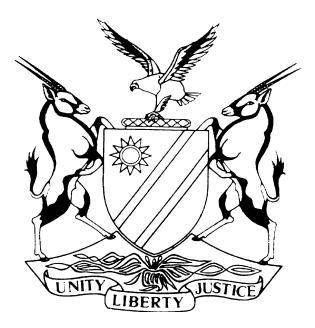REPUBLIC OF NAMIBIA

HIGH COURT OF NAMIBIA MAIN DIVISION, WINDHOEK
Practice Directive 61
INTERLOCUTORY RULING
Case Title: Nautilus Fishing Industries (Pty) Ltd Applicant and Skeleton Coast Trawling (Pty) Ltd First Respondent Andrew Corbett SC N.O. Second Respondent Prosecutor-General of Namibia Third Respondent | Case No: HC-MD-CIV-MOT-GEN-2022/00107 |
Division of Court: High Court, Main Division |
Coram: The Honourable Justice Coleman | Heard: 17 February 2023 |
Delivered: 6 March 2023 |
Neutral citation: Nautilus Fishing Industries (Pty) Ltd v Skeleton Coast Trawling (Pty) Ltd (HC-MD-CIV-MOT-GEN-2022/00107) [2023] NAHCMD 91 (6 March 2023) |
Order: The first respondent’s interlocutory application is dismissed with costs to include one instructing and one instructed counsel and capped as contemplated in rule 32(11) of the rules of this court.
The main application is postponed to 6 April 2023 at 15:30 for a status hearing and to determine a hearing date. |
Reasons: |
COLEMAN J:
Introduction
This is an interlocutory application by the first respondent for a procedural ruling that a point in limine taken on behalf of the first respondent be heard and determined separate from the main application and before the main application is heard. In essence, the point to be determined is that a party who complies with a court order as sought by the applicant in these motion proceedings cannot subsequently be charged with a criminal offence or subjected to prevention of organised crime (POCA) procedures. This point became pertinent due to the joinder of the Prosecutor-General of Namibia (the Prosecutor General) as a third respondent in this matter and her stance herein.
Pertinent facts and submissions
The main application is for an order to make the arbitration award by Andrew Corbett SC, published on 27 January 2022, an order of court. This award orders the first respondent to make certain payments. The first respondent contends, amongst others, that if forced to make some of these payments it would potentially commit crimes.
It is contended on behalf of the first respondent that the point in limine must first be determined. It had been caused by the Prosecutor-General’s erroneous approach, according to the first respondent. The first respondent is concerned that while the Prosecutor-General does not participate in these proceedings, she holds the erroneous view that she cannot be prevented by a court order from deciding whether or not to prosecute. In first respondent’s view, this issue should be conclusively determined before the main issue of whether or not the arbitration award should be made an order of court is decided. It is submitted that it is both convenient and necessary to prevent the first respondent and its directors from potentially going through a prosecution.
The applicant contends that it is neither convenient nor necessary to determine this point in advance and separate from the main application. According to the applicant, a lot of time and resources had already been spent and this is another delay.
I have read the papers in the matter and considered all the submissions on behalf of the parties. I mean no disrespect in not articulating each and every contention herein.
It is submitted on behalf of applicant that it is not sure in terms of what rule this application is brought. It is assumed it is rule 63(6) of this court’s rules. While it appears to me that rule 63 is aimed at pending actions, I accept that I am empowered to make a procedural direction such as this.
The first respondent seeks a ruling from me now that the issue, that in the event it is found that the arbitrator’s award should be made an order of court – and executed – the Prosecutor-General will be bound by the judgment and not permitted to prosecute the first respondent, be heard and determined in isolation from the rest of the application.
The first respondent’s answering affidavit was deposed to on 22 April 2022. The Prosecutor-General was eventually joined as third respondent on 18 August 2022. According to the first respondent the issue now before me became pertinent when the Prosecutor-General filed her affidavit in October 2022. However, in its answering affidavit, the first respondent – while not depicting it as in limine per se – raised the issue that if it complies with the award, it will open itself up to possible criminal charges. This was raised in the context of the contention that the arbitration award is not enforceable since it is not an ‘award’ as envisaged in the Arbitration Act, 1965, and it is contra bonos mores.
Therefore, in my view that the issue of the first respondent’s potential prosecution, if it should comply with the arbitration award, is rolled into the dispute about enforcing the award in general. It is not practical and does not make sense to separate it as contended on behalf of the first respondent. It will be more convenient and contextually more sensible to hear it with the rest of the issues raised in the application.
As far as costs are concerned, a variety of options had been canvassed during the hearing. I am of the view that it is sensible to have costs follow the event of this interlocutory application and put it to bed entirely.
Accordingly, I make the following order:
The first respondent’s interlocutory application is dismissed with costs to include one instructing and one instructed counsel and capped as contemplated in rule 32(11) of the rules of this court. The main application is postponed to 6 April 2023 at 15:30 for a status hearing and to determine a hearing date. |
Judge’s signature | Note to the parties: |
| Not applicable. |
Counsel: |
Applicant | First Respondent |
Adv Bassingthwaighte Instructed by Koep & Partners, Windhoek | Adv Tötemeyer SC Assisted by Adv Dicks Instructed by Engling Stritter and Partners, Windhoek |
